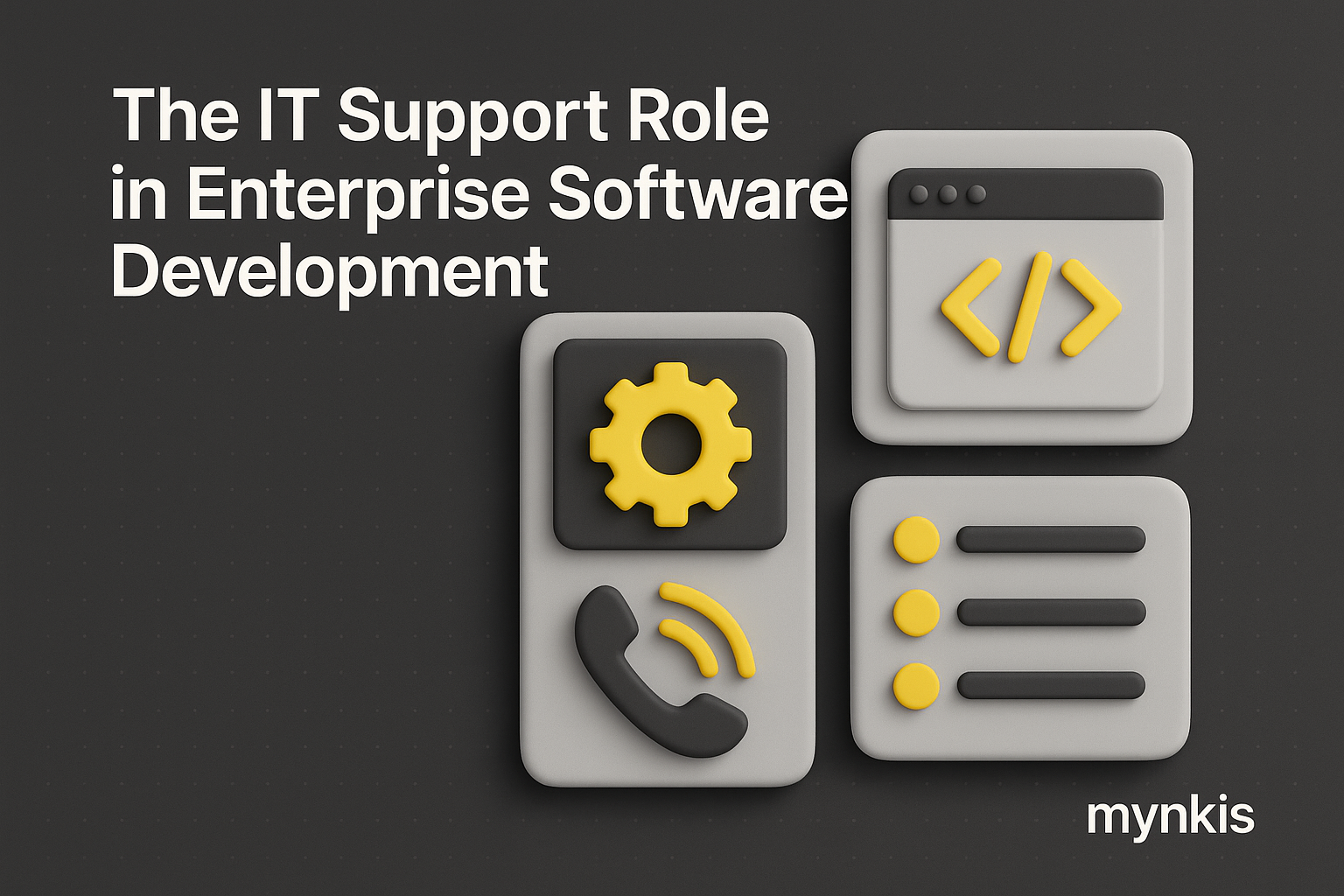Schedule a Demo
IT support is often the unsung hero of successful software and web development projects, particularly for large organizations aiming to build custom solutions for enterprise-level needs. From internal tools that streamline operations to customer-facing portals designed to enhance user experience, the integration of dedicated IT support can mean the difference between a project that transforms business processes and one that's mired in technical glitches.
At its core, IT support in software development involves a broad spectrum of services that facilitate the smooth execution of projects. In my years advising organizations across various industries, I've seen IT support range from managing infrastructure needs to providing end-user training and addressing unexpected technical challenges.
Supporting technologies used in software development include diverse tools like version control systems, build servers, and agile project management software. IT support personnel ensure these tools are correctly integrated, maintained, and optimized throughout the development lifecycle. This not only impacts efficiency but also critically affects the quality and reliability of the final software product.
Incorporating reliable IT infrastructure support can drastically improve the collaboration between developers, project managers, and the stakeholders within a large organization. According to a study by the Project Management Institute, seamless communication and collaboration can reduce project timelines by up to 30%. Integrating solutions like secure VPNs, comprehensive IT helpdesk services, and collaborative platforms positions developers to work effectively from remote locations.
In the integration of new enterprise software, IT support plays a pivotal role in setting up and refining these communication channels to maximize the interaction between all parties involved. Ensuring high-availability network solutions and data storage facilities also reduces the likelihood of technical disruptions that could delay software rollout.
Every software project encounters its fair share of technical hurdles, whether it's integrating legacy systems, ensuring cybersecurity, or handling scalability. I've found that proactive IT support teams bring invaluable expertise to mitigate these challenges. For instance, addressing potential vulnerabilities before they disrupt service is a game-changer for software continuity and user trust.
When developing custom solutions like high-performance websites or enterprise-level software applications, IT support professionals not only troubleshoot but also design systems for greater resilience. They are often the architects behind effective data backup strategies and recovery plans that are crucial for maintaining continuous operations.
One key aspect where IT support makes a tangible impact is in scalability and performance optimization for custom software solutions. As the demand for new features and capacity grows, the IT support team can ensure that the underlying infrastructure scales without compromising system performance.
I recall a project where scaling a customer portal during peak usage periods was vital to handle increased traffic without service interruptions. Our IT support team identified bottlenecks and implemented cloud-based solutions, which resulted in not only a smooth experience for thousands of users but also accommodated growth with future-proof considerations.
Beyond tech wizardry, IT support shines in educating end-users on new systems. A fantastic user experience stems from ensuring that all users are comfortably acclimated to the technology, minimizing friction when transitioning to new software or internal tools.
Providing training, detailed documentation, and responsive user support post-deployment establishes a foundation for long-term success. In my experiences with organizations adopting custom enterprise software, quick and thorough support promptly resolves the first hurdles users typically face, thereby fostering swift adoption and reducing stress across the board.
The journey doesn't end with the launch of new software; continuous improvement and maintenance are pivotal components of sustained success. IT support professionals keep the systems up-to-date and efficient through regular updates, monitoring, and strategic enhancements.
Ensuring that feedback loops between developers and end-users are established allows for a culture of continuous improvement. Changes to enhance the user experience and remove inefficiencies keep the enterprise software pertinent to evolving business needs.
Cybersecurity should never be an afterthought in the landscape of modern software development. From architecture to the final code, IT support specialists introduce and uphold critical security protocols, with practices like frequent audits and penetration testing to safeguard the software against breaches.
The objective is to craft solutions like secure customer portals where data integrity is non-negotiable. The engagement of IT support in evolving cybersecurity strategies means that even with scalable development tools, no shortcuts are taken where user privacy and data are concerned.
Having a dedicated IT support team intensifies the capacity to handle all aspects of a software development project proficiently. Observing an improved project trajectory often boils down to the collaborative dynamic between developers and the IT crew, characterized by a hands-on and proactive stance.
This value is seen in large organizations dealing with custom enterprise software solutions and the upskilling of their internal capabilities. Fortifying infrastructure, demystifying tech hurdles, perpetuating system improvements—this multidimensional support enriches the development of sustainable, high-performance software and websity.
